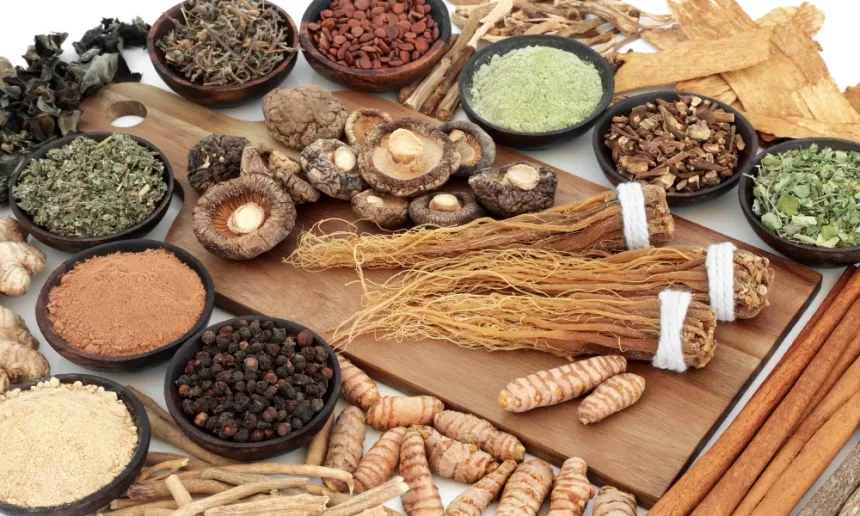Adaptogenic Herbs for Adrenal Fatigue
Adrenal fatigue, although not a recognized medical condition in a formal sense, is a description of stress and its consequences on adrenal gland function. These glands secrete hormones such as cortisol and thus exert control over stress response, energy balance, and systemic homeostasis. However, chronic stress can thus overtax the adrenal glands, leading to fatigue, brain fog, and low energy. Adaptogenic plants represent phytotherapy that may, in turn, promote the maintenance of the human organism’s stress resistance and recovery of homeostasis. Let’s consider the most effective adaptogenic herbs for adrenal fatigue and their mechanisms.
What Are Adaptogenic Herbs?
Adaptogens are a special class of plants and herbs that:
- Help regulate the body’s stress response.
- Promote hormonal balance.
- Enhance physical and mental endurance.
In comparison to stimulants, adaptogens act gently over a period and create resilience to stress.
Top Adaptogenic Herbs for Adrenal Fatigue
- Ashwagandha
Ashwagandha is one of the best-investigated adaptogens, with a reported effect of cortisol regulation lowering and increasing energy.
Benefits:
- Reduces stress and anxiety.
- Supports better sleep.
- Boosts physical endurance.
How to Use: Take ashwagandha as a tea, capsule, or powder. Daily consumption of 300-600 mg would be sufficient for most.
- Rhodiola Rosea
Rhodiola is widely discussed for enhancing mental focus and for its ability to treat burnout.
Benefits:
- Reduces fatigue.
- Enhances cognitive function.
- Supports physical performance.
How to Use: More commonly in the form of a tincture or capsule, doses from 200-400 mg/day.
- Holy Basil (Tulsi)
Holy basil is a very prized plant in Ayurveda due to its sedating and balancing properties.
Benefits:
- Reduces cortisol levels.
- Improves immune function.
- Helps regulate blood sugar levels.
How to Use: Wear as a tea or drink in capsule form.
- Maca Root
Maca root is well known for its enhancing purposefulness and endocrine protection.
Benefits:
- Enhances stamina and endurance.
- Balances hormones.
- Supports emotional well-being.
How to Use: Maca powder is sold as a supplement to be mixed with shakes or down in capsule form.
- Ginseng
Ginseng is a potent adaptogen that can be applied to the adrenal axis and energy supply.
Benefits:
- Boosts physical and mental energy.
- Strengthens the immune system.
- Reduces the effects of chronic stress.
How to Use: Asian or American ginseng is regularly consumed in tea or capsule form.
Tips for Using Adaptogens for Adrenal Fatigue
- Consistency is Key: Adaptivegens have delayed effects, so use regular.
- Combine with Lifestyle Changes: Pay attention to sleep, healthy eating, and stress reduction (where possible).
- Consult a Professional: Communicate with a healthcare professional to identify the appropriate adaptogens and dosage for your use.
Adaptogenic Herbs for Horses
Stress and associated hormone dysregulation in humans may affect horse health and behavior. Adaptogenic herbs are also increasingly being used in equine management as natural agents for the enhancement of resistance, reduction of stress and general health of the horse.
Why Use Adaptogenic Herbs for Horses?
Horses are regularly subjected to stressors, including training, travel, competition and changes in the environment. Prolonged stress can lead to:
Behavioral issues.
- Reduced immunity.
- Hormonal imbalances.
- Poor performance.
Adaptogenic herbs increase the tolerance of horses to stress restore homeostasis and accelerate recovery from physical or psychological stress.
Top Adaptogenic Herbs for Horses
- Ashwagandha
Just as the human benefit is, ashwagandha is useful in lessening stress and anxiety in horses.
Benefits:
- Promotes calmness.
- Supports adrenal function.
- Reduces anxiety during transport or competitions.
How to Use: Administer ashwagandha powder mixed into feed. Consult a vet for appropriate dosages.
- Rhodiola Rosea
As an energy-sparing agent, Rhodiola is best suited for the performance horse regime.
Benefits:
- Improves stamina and endurance.
- Reduces fatigue.
- Supports recovery after intense activity.
How to Use: Often available in powdered form for equine use. Follow veterinary guidelines for dosing.
- Schisandra
Schisandra, a berry-based adaptogen, is used to improve [energy] and [liver] function.
Benefits:
- Enhances liver detoxification.
- Reduces stress-related fatigue.
- Boosts immune function.
How to Use: Administer Schisandra extract or Schisandra powder to the horse diet at the recommended doses.
- Eleuthero (Siberian Ginseng)
Eleuthero is commonly used because it is thought to potentiate athletic performance.
Benefits:
- Increases stamina and endurance.
- Reduces stress and anxiety.
- Supports immune health.
How to Use: Especially often, as a supplement, in the form of powder, or in liquid.
- Licorice Root
Licorice root is a cortisol regulator and has relevance to a horse in adrenal fatigue.
Benefits:
- Reduces inflammation.
- Supports adrenal function.
- Improves digestion.
How to Use: Mix powdered licorice root into feed. Prolonged use should be monitored by a veterinarian.
General Guidelines for Using Adaptogenic Herbs in Horses
- Choose High-Quality Products: Make sure the herbs are free from contaminants and conform to the safety standards for equines.
- Start with Small Doses: Introduce herbs gradually to monitor your horse’s response.
- Combine with Proper Care: The system works most effectively in combination with a balanced diet, adequate physical activity and anti-stress activities.
- Consult an Equine Veterinarian: Never use herb treatments and doses on your horse without professional advice.
Summary
Adaptogenic herbs provide a safe alternative to manage stress and restore adrenal function in humans and horses. In individuals suffering from adrenal fatigue, ashwagandha, rhodiola, and ginseng are herbs that can rebalance and increase energy. In the same way, for the health of horses, adaptogens have the potential to improve performance, alleviate anxiety and foster resistance.
Indeed, while the adaptogens are potent agents, they function at their full potential when included in multidisciplinary care with proper nutrition, physical activity and stress control. Never begin a new regimen for yourself or your horse without first consulting a health care provider or veterinarian.



